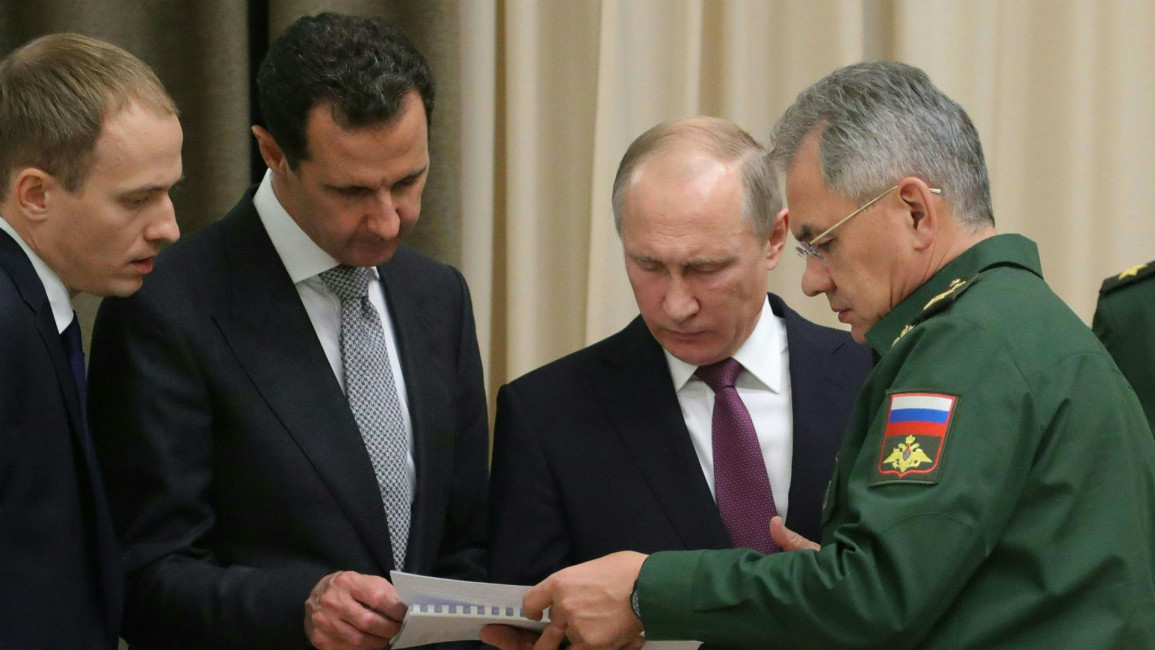
Syrian activists call for boycott of pro-Moscow group, as Russia looks to decide the peace
Syrian activists are calling for opposition groups to exclude pro-Moscow delegates from negotiations with the regime, as Russia looks to direct peace talks towards Bashar al-Assad's survival.
A hashtag - #Moscow_Platform_Out - is being used and a petition set up by Syrians calling for the isolation of the "Moscow Platform", as opposition groups head to the Saudi capital to prepare for upcoming Geneva negotiations.
"Reject the Moscow Platform is a campaign launched by Syrian activists designed to send a message to the participants in Riyadh, demanding the exclusion of the [pro-Moscow] delegation from negotiations," the anti-regime activists' group said on Facebook.
Activists view the Moscow Platform - which touts itself as an opposition group - as little more than a front for Russian and Syrian regime interests, and including them in the High Negotiations Committee (HNC) would badly backfire.
Some suspect the delegates are spies for the regime during behind-the-scene opposition talks, while others view them as troublemakers looking to sabotage cohesion in the anti-Assad camp.
 |
Activists believe Hijab's decision - days before the Riyadh meeting - indicate he is unhappy with what will be concluded there. |  |
Saudi Arabia has called for the Riyadh meeting in order to "unite the opposition", which would likely mean the Moscow Platform delegates would be included in the HNC.
On Monday, Riyad Hijab resigned as chief of the HNC. Although he did not give a reason, activists believe his decision - days before the Riyadh meeting - indicate he was unhappy with what will be concluded there.
Low point
Syria's opposition are preparing for negotiations in Geneva at one of their lowest points.
Rebel territories in Syria have rapidly shrunk, while the regime have captured key oil and gas installations in the east of the country.
Assad's success is largely down to Russian airpower and Iranian militias on the ground.
Opposition groups have been left isolated with backers Saudi Arabia and Qatar at loggerheads and the US appearing uninterested in negotiations.
|
|
A meeting in Sochi on Monday between Iran, Turkey and Russian officials saw the unexpected appearance of Bashar al-Assad in Russia, hinting that the Syrian leader will likely survive the war.
Assad's awkward embrace of Vladimir Putin also symbolised Syrian subservience to Russia, which comes two years after Moscow entered the war helping turn the war in the regime's favour.
A phone call between Trump and President Donald Trump shortly after indicates that the US will back Russia's plans to end the war - another disaster for the opposition.
End times
A recent sign that Russia wants peace talks on its terms is the establishment of the Sochi negotiations.
Although the 2 December will be boycotted by the opposition it will also coincide with the UN's Geneva conference perhaps as an attempt by Russia to eclipse it.
Moscow and the Syrian regime have tried to frustrate repeated UN and US efforts to end the war, which could have led to the departure of Assad from power.
Russian-sponsored Sochi and Astana negotiations have been focused on political reforms and superficial changes - such as amendments to the country's constitution - rather than creating the conditions for a lasting peace.
Russia carries huge influence with the regime and has substantial military muscle in Syria, which could be used to force opposition delegates to eventually follow their peace track.
Despite the establishment of Turkey-Russia-Iran sponsored "de-escalation zones" Moscow's aircraft still regularly pound opposition areas and recent bombardments in Eastern Ghouta have coincided with the upcoming negotiations.
Russia - and Iran - are now the major power brokers in Syria. After all its efforts, Moscow will look to ensure its client stays on as president once peace eventually arrives to Syria.



